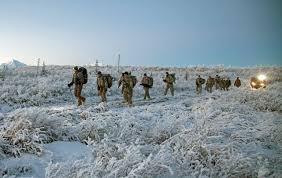On King William Island, the rangers traveled west in a long line of snowmobiles. Some pulled wooden sleds, heavy with food, camping gear, and military equipment. I joined the procession on a borrowed machine, and after several frigid hours driving into the enormous night, we reached a frozen lake called Kakivakturvik.
在威廉国王岛,骑警乘坐着雪地车一路向西。有些人拉着满载食物、露营装备和军用装备的雪橇。我坐在一个借来的机器上面,加入了他们,在寒冷的黑夜里开了几个小时后,我们终于到达了一个叫做卡齐瓦图维克的冻湖。
In bright beams of headlamps and headlights, the rangers scattered over the lake and began setting up large canvas tents on the ice. Caribou skins and tarps were dragged in, then foam mattresses, sleeping bags, coolers filled with food.
在各种头灯的光线中,骑警在湖面上四散开来,开始在冰面上用帆布搭建帐篷。先搭好驯鹿皮和油布,在放泡沫垫子,睡袋,冷却器里塞满食物。

Soon the tents glowed with lantern light and whispered with the sound of kerosene stoves. Steaming cups of tea were passed around, a few stories shared about favorite sled dogs, and then it was back outdoors. In small groups the rangers fanned out over the lake, chopped holes in the foot-thick ice, and dropped fishnets into the black water.
很快帐篷里亮起了灯,伴着煤油灶发出的声音响起了人们低语。装着热茶的杯子被四处分发,人们讲着最爱的雪橇犬的故事,声音传到了帐篷外。骑警们呈扇形分小组坐着,在一足深的冰面上凿好窟窿,再把渔网扔进黑色的水里。
Across the Canadian Arctic, ranger patrols mix military exercises with traditional activities such as hunting and fishing that are still a necessary part of life in the far north. Over the next several days Marvin's group tried to balance these with the martial stuff of navigation drills and training on GPS devices.
在加拿大的北冰洋沿岸,骑警们巡逻的时候还会做各种训练,以及诸如打猎、钓鱼这样的传统活动,这些在遥远的北方仍是生活必不可少的一部分。在接下来几天,马尔文的队伍想把这些跟他们的军事活动平衡一下,比如导航钻孔和用定位设备训练。
Strong winds hurtled off the frozen sea, and thick fog and clouds hung low over the tundra. The temperature rose toward freezing a couple of times, then fell again and stayed far below zero. All this was typical for late November, and soon our lives collapsed into the small white and gray world around camp.
强风席卷过冰冻的海面,浓雾和乌云沉沉的压在冰原上空。结冰的时候温度几次上升,然后再次落到零度以下。这是11月的典型特征,很快我们的生命就会终结在小小的白色或者灰色的帐篷周围。













